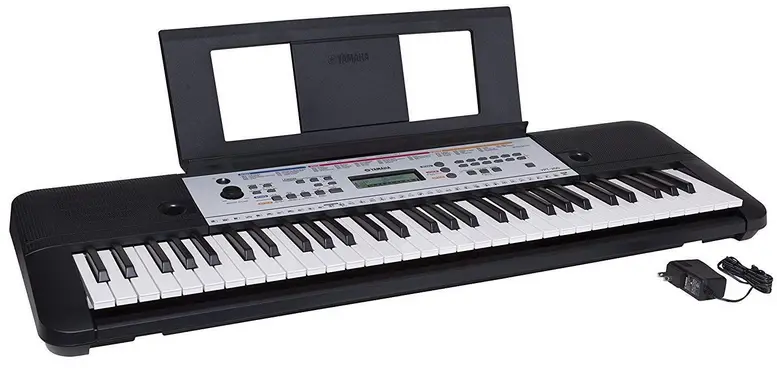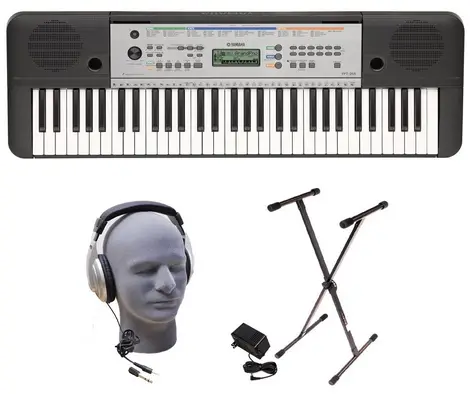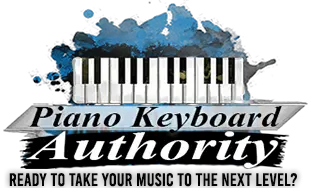Table of Contents
Introduction
Do you ever ask yourself: which keyboard is the best for beginners? You might ask this if you’re still new to the world of music or if you are not very familiar with keyboard brands at all. For those of you who want to learn how to play the keyboard piano but don’t know which one is the best for beginners, we’ve got a great guide in store for you!
Not all keyboards are fit for beginners, as some of them have advanced controls, price ranges that are too high and the like. If you need help, read on below to find out how you can choose the best keyboard if you’re still a newbie.
Which Yamaha Keyboard Is Best For Beginners?
Yamaha is a great brand when it comes down to quality keyboards, especially for beginners and music students. Personally, we’d like to recommend the following beginner keyboards for you to practice on without breaking the bank:
 Yamaha YPT260
Yamaha YPT260
This 61-key keyboard is a great choice if you just want a simple one to learn to play the keyboard with. It has the following key features and advantages:
- 400 voices, 130 accompaniments, 112 demo songs
- 32 max polyphony
- Comes with a power supply
- You can record and playback your music
- AUX input for your computer, phone or tablet
- Can be integrated with the Yamaha Education Suite for beginners
- Has a headphone jack for quiet and private practice sessions
- Duo mode – two voices can be played at the same time
 Yamaha YPT255
Yamaha YPT255
Yet another great 61-key keyboard that you can have if you’re a newbie to playing, this one has the following pros and specs:
- Comes with Samson HP30 Headphones for quiet practice
- Includes a keyboard stand that’s easy to assemble
- Comes with the needed power supply
- AUX input for your computer, phone or tablet
- Can be integrated with the Yamaha Education Suite for beginners
- 385 voices to choose from
Is A 61 Key Keyboard Enough?
It depends on the kind of player that you are. But for beginners, generally, yes, a 61-key keyboard may be enough for you.
To explain why a 61-key keyboard would be enough for beginners, here are the different usual number of keys that you can find on a keyboard and to which user or musician they are best used with:
25-key Keyboards
These keyboards are usually small and are meant for travel or portable use. They can usually be found on gigs and used as a synthesizer rather than playing chords on them. They can be connected to a computer, laptop or a thing called a “sound module”, which gives the keyboard its own distinct “sound” if it doesn’t have its own sounds (e.g. a MIDI controller).
The 25-key keyboard is best used for someone who doesn’t really need to play the piano on its own. These small keyboards are used as a supplementary keyboard to a much bigger one. You can use it to make lead synths, guitars and the like.
49-key Keyboards
These keyboards are slightly longer and are also great for beginners, but they can be too short if you are playing other pieces of music that may need more octaves (note ranges) to play. A 49-key keyboard will also usually be a MIDI controller, meaning that you need a computer or a sound module (mentioned above) to get it to work.
However, there are also some keyboards that can operate on their own. Most keyboards of this size can also be battery-operated! Yes, you can take them wherever you go and play them like they were plugged on an AC adapter because you can listen to your sound using its speakers.
61-key Keyboards
Such keyboards are the best keyboard types for beginners. They are not too short and aren’t too long either. Most of them can either be MIDI-compatible or analog ones that have cool sounds and tones on their own. They will be perfect for accompanying most piano pieces with the sufficient amount of octaves or key ranges.
If your music piece isn’t anything very long range like, for example, Beethoven’s “Moonlight Sonata mvt. 1”, in which you need to use a much lower octave to be able to play the low notes properly, a 61-key keyboard may not be that ideal for you. But like we said, if you are still beginning to play the piano, most piano pieces for the keyboard can be okay with any 61-key since it covers a lot already.
88-key Keyboards
For the truly professional, or at least if you want to be able to play Moonlight Sonata properly, an 88-key keyboard will be the granddaddy of them all at the very most. 88-key keyboards tend to take more space, but the result will be great.
Beginners can be able to play 88-key keyboards, however, it’s not very much recommended unless you have a lot of space at home. For someone who is still learning the basics, too many keys can overwhelm you, and that’s why you should just stick to the 61-key if you’re still in the learning process.
How Many Keys Should A Keyboard Have For Beginners?
Like we said above, a 61-key keyboard or a 49-key keyboard would be great for beginners. Here are the main reasons why you should stick to that range if you’re not very good with the keyboard just yet:
1. Too many keys can overwhelm you.
Like we mentioned above, if you’re faced with a lot of keys at once, you might get overwhelmed and forget which position is the middle C, which is the higher C, etc. It can be confusing as to which key sounds like this and that, especially if you are learning the piano without sheet music (which most people do nowadays due to the power of the internet).
2. You will find it easier to memorize the key positions.
If you have fewer keys to deal with, that means you can know which C is the right C to press and which C goes with which hand. Memorization and familiarization are important in any performance, much like when you are typing on a keyboard (or typewriter, if you lived in the 80s or 90s).
Do you ever wonder how some piano or keyboard players can be able to play it without looking, or even more intense, being blindfolded? It’s all in the technique and in the touch. It’s similar to how blind people are able to use Braille to communicate with people. If you memorize the position of the keys, you can even sing while playing the keyboard just fine and just glance for a little while.
3. It takes less space at home or anywhere.
Many beginners usually never thought of having a piano or keyboard at home, especially if you live in a dorm, apartment, condo unit or anything that’s quite small and less spacious. Usually, a smaller keyboard will be the best for such areas.
Another great thing about this portability is that you can take it with you anywhere for practice. 88-key keyboards can usually be too bulky to carry and may be more suited for staying at home. If you want to bring your keyboard to your next vacation in Florida or California, especially in the wilderness or by the beach, bringing a portable, battery-operated keyboard with just enough keys can be helpful to train your finger skills.
4. Most beginner pieces don’t require a lot of octaves/keys on your keyboard.
While it is true that most Mozart and Beethoven pieces require you to dig deeper into the keyboard’s lower or higher octaves or key ranges, many beginner pieces don’t really need a lot of keys for you to play. In short, 61-key or 49-key models may really be suitable for learning and playing such pieces, anyway.
5. Smaller keyboards tend to be less pricey.
Why do we talk about this? Think about this scenario – your child wants to learn how to play piano, so you buy them the best and most expensive one, only to be disappointed that your child eventually gives up or gets tired of practicing, and the piano is now in the dust.
By starting out small at first, you will be able to save some serious $$$ in case you, your child, or someone you know, eventually decides to quit playing or practicing the piano keyboard. You can be at peace of mind when you know that your keyboard is not too expensive to break or abandon, especially if the person who will use it is a little child.
Conclusion
Choosing the right keyboard for beginners can be tricky if you’re not a music person. This is why we did the work for you. We hope this mini guide can help you choose the right keyboard for beginners!
Are you interested in the Yamaha YPT260 and the Yamaha YPT255? Do check out their full prices on Amazon and start learning/playing the keyboard today!
